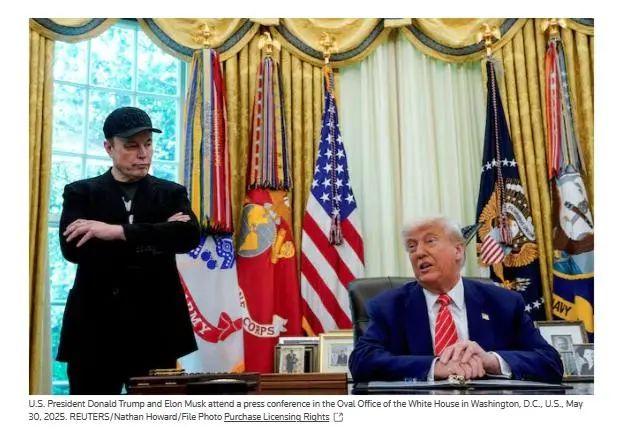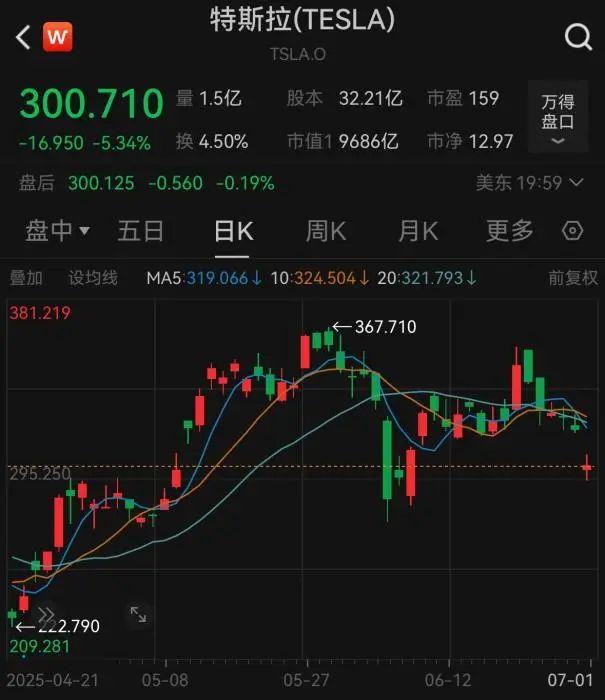

Not more than a month into the dispute, tensions between President Donald Trump and Tesla CEO Elon Musk have escalated. Musk has repeatedly criticized the “Bigger is Better” bill on social media platforms and promised to form a new political party, while Trump threatened to use federal government power to punish his former advisor.
The second round of public confrontations between the two has led to a continuous decline in Tesla’s stock price, plunging the company once again into crisis.
Tesla’s stock price trend. Data source: Wind
Tesla’s stock price has accumulated a decline of over 10%
Recently, Tesla’s stock price has continued to fall, with a cumulative decline of over 10% in a week.
Musk’s dissatisfaction with the “Bigger is Better” bill has become the catalyst for this dispute. Recently, Musk has criticized the bill multiple times on social media, describing it as “absurd,” “revolting,” “crazy and destructive,” and believes that the bill “gives handouts to sunset industries but severely damages future industries.”
He also warned that the bill would raise the government debt ceiling, putting the United States “on the fast track to being debt-slaved.”
Trump then countered, accusing Musk of “anger and embarrassment at losing support for electric vehicles,” hinting that “this is just the beginning, he might lose even more.”
Trump mentioned that Musk’s subsidies “might be more than any person in history,” and declared, “If there were no subsidies, Musk might have to shut down and return to South Africa. If we stop launching rockets, producing satellites, or electric cars, our country will save a lot of money.”
According to Reuters, the Trump administration controls several subsidy programs including $7500 in consumer credit exemptions, and the “Bigger is Better” bill plans to cut some of these subsidies. This could threaten Tesla’s massive tax credits and policy benefits gained through its clean transportation and renewable energy businesses.
Morgan Stanley analysts had projected at the beginning of the year that scrapping the electric vehicle tax credits could reduce Tesla’s annual operating profit by $1.2 billion (approximately 17% of its expected profits in 2024).
Under the impact of reduced subsidies and public opinion wars, Tesla’s stock price has once again fallen. Gary Black, a long-term holder of Tesla stocks at Future Fund LLC, is currently reducing his holdings in the company. He told Reuters that the cancellation of subsidies would have a significant impact on Tesla.
The split escalates multiple crises
Tesla’s current challenges extend beyond subsidy issues; the public breakup between Musk and Trump is bringing multiple shocks.
According to Reuters, Tesla is betting on the autonomous taxi pilot program in Austin, Texas. However, the pace of expansion largely depends on the regulatory standards set by federal and state governments for autonomous technology.
“The core value of Tesla’s valuation lies in the progress of autonomous driving. Although this field has not been directly affected, there are potential risks,” said Jean Monest, partner at Deepwater Associates, a Tesla investment firm. Additionally, the US Department of Transportation also holds the power to decide whether Tesla can mass-produce autonomous taxis without pedals or steering wheels.
Moreover, SpaceX, owned by Musk, holds approximately $22 billion in federal contracts. Tesla also makes substantial profits by selling regulatory credits to companies that fail to meet standards, accumulating nearly $11 billion. Without this income, Tesla’s first-quarter financial report for April should already show a loss.
As early as early June, when the “Bigger Than Big” bill sparked intense controversy, Trump had threatened to cancel Musk’s government contract. Unaffiliated analysts estimate that the bill could increase U.S. debt by about $3 trillion.
At the same time, Tesla itself faces a dilemma of weak sales growth.
Analysts predict that the delivery figures for Tesla’s second quarter, which are due to be released soon, may once again show weakness. The latest data on July 1st reveals a divergence in sales performance across its main markets in Europe. Analysts believe that Musk’s recent firm stance has also led to potential customer loss in some global markets.
Despite the ongoing conflict between Musk and Trump, it seems inevitable that his impact on Tesla and his business empire will continue. Market concerns about his future are growing.